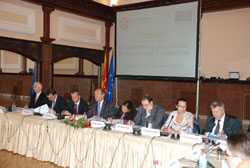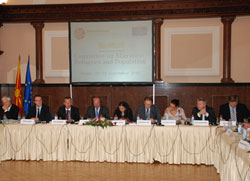Monday, 20 September 2010
INTRODUCTORY ADDRESS BY THE PRESIDENT OF THE ASSEMBLY OF THE REPUBLIC OF MACEDONIA, MR. TRAJKO VELJANOSKI, AT THE MEETING OF THE COMMITTEE ON MIGRATION, REFUGEES AND POPULATION OF THE PARLIAMENTARY ASSEMBLY OF THE COUNCIL OF EUROPE
 Distinguished Chairman of the Committee Mr. Greenway,
Distinguished Chairman of the Committee Mr. Greenway,
Distinguished colleagues, MPs,
Ladies and gentlemen,
It is my honour and pleasure, on behalf of the Members of the Assembly of the Republic of Macedonia and on my personal behalf, to open the Meeting of the PACE Committee on Migration, Refugees and Population, held during the Macedonian Chairmanship with the Council of Europe.
The Assembly of the Republic of Macedonia is paying special attention to the possibility to chair the oldest Pan-European Organization and to contribute to the achievement of the common European goals and values. Since 1995, when the Republic of Macedonia became a Candidate Country, it actively participates in the work of the all the institutions in the framework of the Council of Europe, but at the same time it fulfils the responsibilities deriving from the membership.
Our commitment for wide promotion of the goals and efforts of the Council of Europe during the past year has been enforced and it is expressed through several activities. On the occasion of the 60th Anniversary of the establishing of the Council of Europe, Assembly of the Republic of Macedonia held a Special Session dedicated to the promotion of the principles of human rights and freedoms, democracy, and the rule of law - values which are identified in all the democratic European states. We have organized campaigns and round tables dedicated to the rights of the child, women’s rights, disabled persons’ rights, and other topics associated with the work of the Council of Europe. During the Macedonian Chairmanship with the Council of Europe we have hosted the Meetings of the Biro and the Standing Committee.
The initiative to invite the Committee to hold its Meeting in the Republic of Macedonia was inspired by the fact that the topics which are discussed by this Committee are very relevant in this Region and in the whole of Europe.
Ladies and gentlemen,
With its conventions and campaigns the Council of Europe raises the awareness of 800 million Europeans and, together with the EU, establishes the standards in the area of promotion and protection of human rights. The fight against human trafficking is one of them. It is a type of modern slavery and one of the worst forms of violation of human rights. This phenomenon does not recognise borders and can be eliminated only with a common approach on international level. There are many mechanisms in Europe to achieve this, and the Convention on Action against Trafficking in Human Beings is the one that stands out. It promotes punishment for the perpetrators and protection of the victims.
Guided by the Recommendation of the PACE, our Assembly ratified this Convention last year, and the Republic of Macedonia is continuously and actively participating in the trans-national mechanisms for fight against human trafficking. In the last few years our country has made significant progress in the fight against human trafficking, which was noted in the reports of the relevant international institutions.
After the visa regime liberalization, the Republic of Macedonia and the other countries in the region have witnessed increased number of requests for asylum in the EU Member States. The Government has taken appropriate measures which have already given results, and the situation now is stabile in this regard. The number of people requesting asylum has significantly decreased. Punishment has been used in several cases, but also restrictions of the work of several tourist agencies which were subject to inspection. We are continuing with preventive measures and activities for raising the awareness and providing information to the citizens about the true meaning of the visa liberalization and the negative consequences and problems for the unsuccessful asylum seekers.
The world is closely and carefully following the latest events regarding the Roma communities in some European States. That is why PACE initiated review of this issue on the urgent meeting to be hold during the October Part Session. According to the Commissioner for Human Rights of Council of Europe, Mr. Thomas Hammarberg, unfortunately there are tendencies of discrimination and repression of the Roma community. He strongly criticized the decision of some European states to deport the Roma refugees to their homeland and called for their integration.
 Allow me to inform you that Roma Ethnicity is a constitutional category in our country and that its members enjoy all the individual and collective rights for preservation and promotion of their national cultural and linguistic identity. In the Assembly of the Republic of Macedonia, since its first constitution, the Roma community has had its representatives, they are present in the Government, the Ministries, and also we have a Mayor who belongs to the Roma community. I believe that we are one of the rare countries which have enabled education in Roma language. As a candidate country for EU membership, we have adopted the National Strategy on Full Integration of the Roma, for improvement of their economic and social status. This issue is not fully resolved in Europe, and we need further joint efforts to improve the social and economic status of the Roma.
Allow me to inform you that Roma Ethnicity is a constitutional category in our country and that its members enjoy all the individual and collective rights for preservation and promotion of their national cultural and linguistic identity. In the Assembly of the Republic of Macedonia, since its first constitution, the Roma community has had its representatives, they are present in the Government, the Ministries, and also we have a Mayor who belongs to the Roma community. I believe that we are one of the rare countries which have enabled education in Roma language. As a candidate country for EU membership, we have adopted the National Strategy on Full Integration of the Roma, for improvement of their economic and social status. This issue is not fully resolved in Europe, and we need further joint efforts to improve the social and economic status of the Roma.
In the framework of the Macedonian Chairmanship with the Council of Europe, in June 2010 we held a Regional Conference dedicated to the access of the Roma to personal documents. The Final Document of the Conference recommends that the Governments should have a coordinative and proactive approach in the identification and assistance to the marginalized people without documents and to solve their problems.
Distinguished guests,
Considering the constant interest of the Committee for monitoring migration, I would like to underline that in the Republic of Macedonia we have the phenomenon of the so-called “potential migration”, and this phenomenon is spreading among the young and highly educated population. In South Eastern Europe, because of its geographic position, the transit and illegal migration are on the increase. In line with the consistent policy regarding these movements, a special Resolution has been adopted on the migration policy of the Republic of Macedonia for 2009-2014. This shows our readiness and determination to share the common European experiences in this specific area.
On this occasion I would like to inform you that the Republic of Macedonia will organize a Census from 1-15 April 2011. This process will include all the ethnic communities and it will secure equitable representation of the minorities on all levels in the census committees and use of the languages of the communities. The state is fully prepared to carry out the Census in line with the European Standards and the Census will be monitored by EUROSTAT, so that the census results will not be questioned.
I hope that with besides opening this Meeting I have raised some issues of interest for your Committee and that they will be thoroughly elaborated by the experts and the members of this Committee.
Thank you for your attention and I wish you successful work.